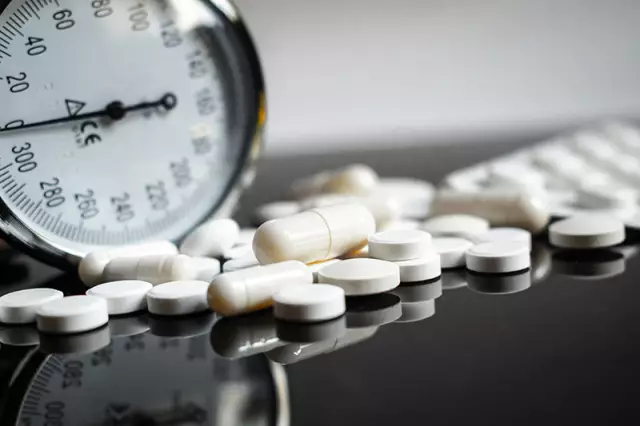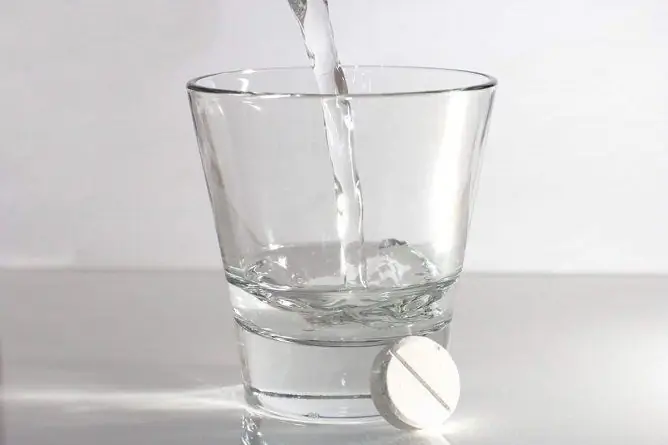- Author Rachel Wainwright wainwright@abchealthonline.com.
- Public 2023-12-15 07:39.
- Last modified 2025-11-02 20:14.
New generation of pressure drugs without side effects for the elderly and patients of other age groups
The content of the article:
- Approach to Prescribing High Pressure Drug Therapy
- Diuretic drugs
- Angiotensin inhibitors
- Adrenergic blockers
- Calcium channel blockers
- Selective imidazoline receptor agonists
- Myotropic antispasmodics
- Complex drugs for pressure
- Video
New generation drugs for pressure without side effects - does it happen? Unfortunately no. An organism is a single integral system, it is impossible to influence any part of it in isolation, that is, so that it does not in any way affect other parts. And although in the new generation drugs the likelihood of side effects is significantly reduced, they should be prescribed by a qualified specialist who will be able to correlate the possible risks with benefits.

All drugs for high blood pressure should only be prescribed by a qualified specialist.
Approach to Prescribing High Pressure Drug Therapy
Arterial hypertension is one of the most common pathologies of the cardiovascular system. High blood pressure can pose a considerable danger to the patient, contributing to the development of severe consequences, including heart attack and stroke.
Patients with arterial hypertension, as well as people from the risk group, often wonder whether there are new generation pressure medications on the pharmaceutical market without side effects and without addiction, and how to choose the most effective remedy for lowering blood pressure (BP). Unfortunately, there are no absolutely harmless medicines without contraindications for use. Even the safest drugs with minimal side effects may be contraindicated for the patient due to individual intolerance to one or another component. With arterial hypertension, self-medication and uncontrolled intake of antihypertensive drugs is not recommended, as this can worsen the patient's condition and develop complications. A list of pressure pills without side effects that can be used in a specific case,can only be compiled by a qualified technician.

Some antihypertensive drugs have a negative effect on the fetus and are prohibited in pregnant women
In case of hypertension, the patient is trying to find a remedy that is the most effective and safe, taking into account the existing symptoms, contraindications and a number of other factors. So, during pregnancy, women with arterial hypertension are prescribed drugs, with the use of which the risk of negative effects on the developing fetus is minimized.
Antihypertensive drugs have different mechanisms of action and affect the body in different ways. Since there is always a risk of unwanted consequences of taking, drugs are prescribed only if the risk is justified. Side effects are associated with the mechanism of action of the drug, the way the substance is excreted from the body, storage properties, a single effective dose of the drug, as well as the individual characteristics of the patient's body.
The newest drugs for hypertension usually have much fewer side effects than outdated counterparts, they are more effective. Due to their prolonged action, modern antihypertensive drugs are usually used in smaller doses, which significantly reduces the likelihood of side effects.
To prescribe adequate treatment, it is required to undergo an examination, after which the doctor will prescribe a good medicine to the patient, which will be most effective in this case, in the optimal dosage, while the dose of the drug is usually indicated in milligrams (mg) per day and the number of doses per day. Some drugs can be purchased in the pharmacy network without a prescription, however, high pressure pills with the least side effects should be prescribed exclusively by a qualified specialist, depending on the cause of the development of the pathological process, the existing symptoms, the presence of complications, concomitant pathologies, the patient's age and other parameters. In some cases, antihypertensive drugs are prescribed for life.
Diuretic drugs
For drug therapy of arterial hypertension, diuretic drugs are often used, i.e. drugs with a diuretic effect. Their mechanism of action is to reduce the reabsorption of sodium ions in the renal tubules, which leads to an increase in the excretion of this trace element and a decrease in the amount of fluid in the body, which leads to a decrease in blood pressure. Diuretics have side effects, including fatigue, dry mouth, nausea, dizziness, heart problems, redness of the mucous membranes of the eyes, emotional lability, seizures, changes in sensitivity in the limbs, exacerbation of gout.
The best modern diuretic drugs that are used for high blood pressure have the lowest possible side effects that, when used correctly, usually do not take extreme forms.
Adverse consequences when taking this group of drugs are usually observed if the dosage prescribed by the doctor is not followed. As a rule, diuretics are prescribed in combination with other drugs, already without a diuretic effect.
The drugs in this group are Furosemide, Indapamide, Hydrochlorothiazide, Clopamide.

Hydrochlorothiazide, a diuretic used to lower blood pressure
Angiotensin inhibitors
Angiotensin inhibitors may be used for hypertension. This group includes angiotensin-converting enzyme (ACE) inhibitors and angiotensin II receptor antagonists. These are effective new generation pressure medications without side effects if they are correctly selected.
When ACE inhibitors inhibit the action of the angiotensin-converting enzyme, the production of angiotensin II, which produces a vasoconstrictor effect, decreases. As a result, blood vessels dilate and blood pressure decreases. Possible side effects of angitensin inhibitors include a too sharp and significant decrease in blood pressure (hypotension), headache, taste disturbances, impaired appetite, muscle weakness, decreased hemoglobin concentration, leukocyte count, increased blood creatinine, proteinuria, and allergic reactions. Medicines are contraindicated throughout pregnancy due to embryotoxicity, as well as when planning pregnancy (during therapy, they should use reliable contraception), in the presence of angioedema, bilateral stenosis of the renal arteries.
Angiotensin II receptor antagonists interfere with the effects of angiotensin II on blood vessels, thereby lowering blood pressure. Side effects of these drugs include the development of an allergic reaction, nausea, dizziness, headache, kidney problems, drowsiness, and muscle and joint pain. Angiotensin II receptor antagonists have the same contraindications as angiotensin-converting enzyme inhibitors. A persistent decrease in blood pressure with the use of drugs from this group is observed after 3-6 weeks from the start of therapy.
The drugs in this group are Lorista, Teveten, Vazotenz.

Lorista is a drug of the group of angiotensin inhibitors
Adrenergic blockers
Among the main drugs that are prescribed for hypertension are beta-blockers. They lower the heart rate, thereby normalizing blood pressure. Beta-blockers of the new generation can also prevent the development of complications that can occur against the background of high blood pressure. Potential side effects include skin rashes, headache, weakness, a significant slowdown in heart rate, nausea, vomiting, diarrhea, flatulence, and dry mouth. According to doctors, beta-blockers of the new generation cause side effects very rarely, in less than 1% of cases. Their use is contraindicated during lactation.
Beta-blockers - Acebutalol, Atenolol, Karteolol.

Atenolol - beta-blocker
Alpha blockers work by blocking the action of hormones that constrict blood vessels. As a result, the vessels dilate. When taking drugs of this group, dizziness, depression, emotional lability, nausea, vomiting, shortness of breath, diarrhea, changes in heart rate (tachycardia or bradycardia), increased blood viscosity are possible.
Alpha-adrenergic blockers - Doxazosin, Zoxon, Tonocardin.
Calcium channel blockers
Calcium channel blockers help to relax the walls of the blood vessels, thereby lowering blood pressure. When using drugs of this group, undesirable effects are possible: dizziness, headache, accelerated heart rate, peripheral edema, dyspeptic disorders, bleeding of the gums, gait disturbance, hyperemia of the skin of the face, increased appetite.
The drugs in this group are Adalat, Amlodipine, Tiazak, Verelan.

Amlodipine - calcium channel blocker
Selective imidazoline receptor agonists
The drugs of this group, by stimulating imidazoline receptors in the brain, inhibit the vasomotor center, reducing peripheral vascular resistance. These are effective drugs for pressure, which are well tolerated by patients and have few contraindications (severe liver and kidney disorders, severe depression, sinus bradycardia) and side effects (headache, weakness, dry mouth).
The drugs in this group are Physiotens, Albarel.

Albarel is a drug from the group of selective agonists of imidazoline receptors
Myotropic antispasmodics
Antispasmodic drugs affect the smooth muscles of the blood vessels, causing them to expand, reduce blood viscosity, reduce the load on the heart, and moderately stimulate an increase in urine output. When using them, headache, dizziness, weakness and fatigue, decreased appetite, increased sweating, heartburn, nausea, and fever may occur.
The drugs of this group are Dibazol, Papaverin, No-shpa.

No-shpa is one of the most popular myotropic antispasmodics
Complex drugs for pressure
It was found that certain combinations of substances mutually reinforce each other and therefore are more effective. Thus, combined preparations were created that contain several active substances in optimal concentration and at the same time have a minimum number of side effects.
It can be a combination of an angiotensin-converting enzyme inhibitor and a diuretic, an angiotensin II receptor antagonist and a diuretic, a beta-blocker and a calcium antagonist.
The advantages of such drugs also include the fact that instead of two drugs, you can take only one, they are suitable for people of advanced age and senility (after 80 years).
For a number of complex medicines, the probability of a negative effect on the body, if used correctly, is so low that they can practically be considered new generation drugs without side effects.
The drugs in this group are Berlipril, Kapozid, Tenochek, Gizaar, Mikardis plus.

Caposide, a combination drug to lower blood pressure
Video
We offer for viewing a video on the topic of the article.

Anna Aksenova Medical journalist About the author
Education: 2004-2007 "First Kiev Medical College" specialty "Laboratory Diagnostics".
Found a mistake in the text? Select it and press Ctrl + Enter.






